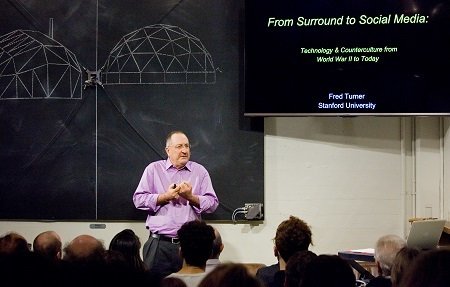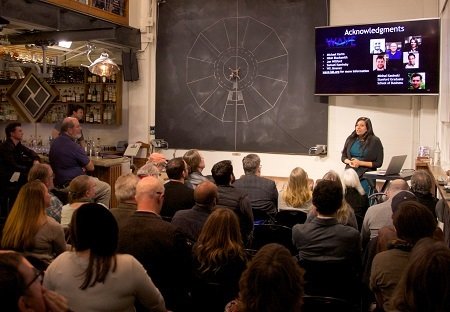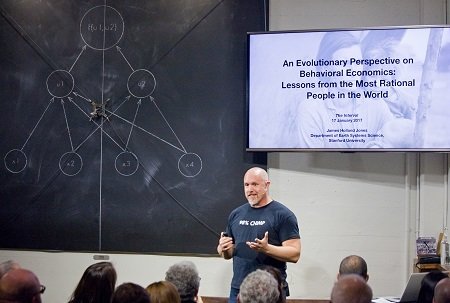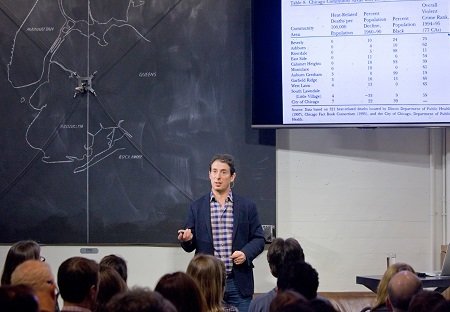
In the past few months, four fellows participated in “Conversations at The Interval” as part of the Center’s ongoing partnership with the Long Now Foundation. On November 15, 2016, Fred Turner (CASBS fellow 2007-08, 2014-15) gave a talk on “From Surround to Social Media: Technology & Counterculture from World War II to Today.” On January 17, 2017, Jamie Jones (2015-16) spoke on the topic of “Rationality Redeemed: An Evolutionary Perspective on Behavioral Economics.” On February 28, Tara Behrend (2016-17) presented on “The Psychology of Surveillance: How Being Watched Changes Our Behavior.” And on March 7, Eric Klinenberg (2007-08, 2016-17) talked about “Climate Change and the Future of Cities.” The Interval will post videos of the talks on its website in the near future.
In late 2016, four former or current fellows contributed articles to the launch of Thrive Global, the new venture from Arianna Huffington. Ruth Chang (fellow 2016-17) published “The Good Life Isn’t About Being Happy;” Rose McDermott (2008-09, 2015-16) published “The Value of Real Contact;” Batja Mesquita published “Feeling Bad About Feeling Bad? Don’t!”; and Maryanne Wolf (fellow 2014-15, research affiliate 2016-17) published “The Deep-Reading Brain and the Good Life.” On launch day Wolf’s piece was a featured selection for Thrive Global’s first e-blast.
Jeffrey S. Raikes, co-founder of the Raikes Foundation, has been elected chair of Stanford University's Board of Trustees. The Raikes Foundation helped establish the Mindset Scholars Network, which is based at CASBS.

In December 2016, in the aftermath of the U.S. presidential election, visiting scholar Hector Amaya published “The Citizens Have Spoken” on 21st Century Global Dynamics, a forum for timely commentary regarding global events, processes, and concerns hosted by the University of California, Santa Barbara.
Inverse interviewed fellow Tara Behrend on “When Surveillance and Psychology Collide,” in which Behrend identified specific areas where American attitudes are out of sync with behaviors and laws.
Visiting scholar Daniela Bleichmar has been named a Burkhardt Fellow by the American Council of Learned Societies. She will be in residence at the Huntington Library during the 2018-19 academic year to perform work on a project titled “The Itinerant Lives of Painted Books: Mexican Codices and Transatlantic Knowledge in the Early Modern World.”
Fellow Brooke Blower is winner of the 2016 Stuart L. Bernath Lecture Prize, recognizing and encouraging excellence in teaching and research in the field of foreign relations by younger scholars. Her lecture, delivered on January 6, 2017, at the American Historical Association annual convention in Denver, was titled “Nation of Outposts: Factories, Forts, Bases, and the Making of American Power.” The lecture will be published in an upcoming issue of the journal Diplomatic History.
Fellow Ruth Chang recently appeared on the TED Radio Hour discussing how making hard choices can empower us.
Chang also is talking to the CIA. That’s all you need to know.
U.S. News & World Report covered a study, authored by fellow Sapna Cheryan and collaborators, addressing the question “Why are Some STEM Fields More Gender Balanced Than Others?”

Fellow Donald Chi authored an op-ed piece in the Washington Post that outlined the impacts on dental health if the Affordable Care Act is repealed.
Fellow Diane Desierto has been recognized by Who’s Who Legal/Global Arbitration Review as one of the world’s top arbitration counsels under the age of 45. Desierto also wrote a blog commentary for the European Journal of International Law outlining the consequences of economic nationalism for international economic law.
“J.C. Abbey, Ghana’s Puppeteer,” a film by fellow Steve Feld, was awarded the Intangible Culture Film Prize by the UK’s Royal Anthropological Institute (RAI). The prize recognizes the best documentary in the fields of music, dance, and performance art in the past two years. The film will screen and the prize will be awarded at the RAI Film Festival in Bristol, U.K., on March 29.
The previous CASBS newsletter reported on a pile of accolades and great reviews for Against Everything, the book by fellow Mark Greif. There’s more. The New York Times announced the book as a National Book Critics Circle Finalist. It was listed as a PEN Literary Award finalist, specifically for the PEN/Diamonstein-Spielvogel Award for the Art of the Essay. And The Chronicle of Higher Education profiled Greif, in relation to the book, as “The Man Against Everything.”
In January, Greif was a featured guest on the public radio program Open Source, in a post-election episode devoted to the resistance movement. He answers the question, “What would Thoreau do?” The full episode is here. An extended version of Greif’s appearance is here. The appearance also was featured in Literary Hub.
The Huffington Post profiled fellow Jonathan Jansen and his perspective on the crisis at South African Universities.
Fellow Andrew Lakoff co-authored an article in Theory, Culture & Society, “Vital Systems Security: Reflexive Biopolitics and the Government of Emergency,” which recently won the David Edge Prize for outstanding article in science and technology studies (STS). The Society for Social Studies of Science, which awards the prize, noted that the paper “seamlessly weaves deep theoretical engagement with rich historical analysis,” complicating “our understanding of biopolitics as an organizing logic of modernist governance.” Further, it “combine[s] empirical data with a clear theoretical framework in a way that reache[s] beyond the boundaries of a particular case to advance thinking in STS.”
Lakoff also co-wrote an essay in the New Republic on how President Trump is using the institutional mechanisms designed to preserve democracy in order to undermine constitutional order.

In December, director Margaret Levi was a featured guest on the radio program Philosophy Talk, which devoted the episode to “The Examined Year – 2016.” Levi’s segment focused on the year in technology and labor. In January 2017, Levi published a piece in The World Post explaining why the diversity of views expressed in the Women’s March is actually an asset. Most recently, Zócalo Public Square conducted an in-depth Q&A about our democracy’s ongoing struggle, and the conversation we need about what institutions can serve a democracy that really thrives.
Fellow Terry Maroney is one of 12 Vanderbilt University faculty members who have been selected as 2017 Chancellor Faculty Fellows. The Chancellor Faculty Fellows program is designed to support outstanding faculty who recently have received tenure by providing funding “that allows the fellows to take their research further and deeper.”
In a Chicago Tribune op-ed published in December 2016, fellow Jack Rakove describes the mechanism that the founders provided as a “solution to Trump.” In January, Rakove was one of three Stanford experts who discussed Trump’s style of communicating and his relationship with the media.
The NL Times, a prominent English language publication in The Netherlands, profiled a recent study by fellow Will Tiemeijer about social divisions in Dutch society and how well, or not, they are covered in the media.
Research affiliate Abraham Verghese is co-author of an article in The BMJ on placing emphasis on the importance of people’s mindsets and social context in the healing process. Coverage here.
“Does Philosophy Hold Crucial Insights for the Neuroscience of Inspiration?” Research affiliate Maryanne Wolf explores the question in an article appearing in Zócalo Public Square.
Research affiliate David Yeager is lead author of a study appearing in the journal Child Development finding that minority youth perceived and experienced more biased treatment and then lost more trust over middle school years than their white peers; the lack of trust predicted whether they acted out and even whether they made it to college later. The results were covered by CNN.
Fellow Barry Zuckerman is co-author of "Mindset Matters for Parents and Adolescents" in JAMA Pediatrics. Zuckerman is funded by the Mindset Scholars Network during the 2016-17 academic year.

